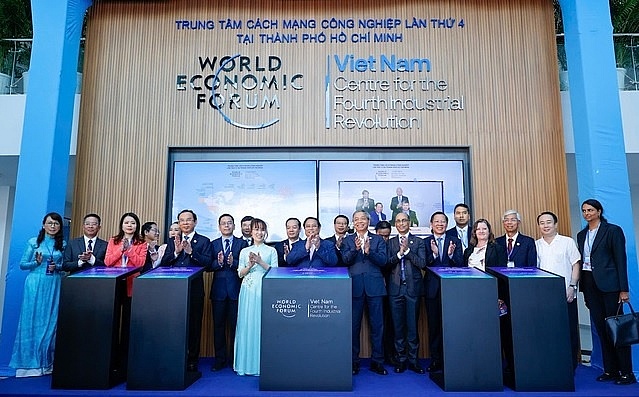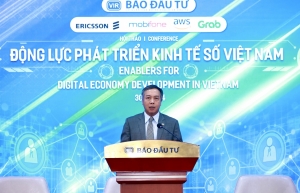Significant investment made in digital realm
Last week, the country launched the Centre for the Fourth Industrial Revolution in Ho Chi Minh City, formed as part of an agreement between the Vietnamese government and the World Economic Forum. The centre is aimed at promoting research and application of advanced technologies such as AI, blockchain, and big data across different fields.
 |
| The HCM City Centre for the Fourth Industrial Revolution was opened on September 25. - Photo nld.com.vn |
The establishment of the centre is expected to create another boost to the nation’s digital economy. Specifically, Vietnamese authorities are promoting investments in the digital economy through significant policies and guidelines.
Vietnam has already crafted strategies for engaging in the Fourth Industrial Revolution, including a goal for nationwide 5G coverage by 2030. The official national strategy for AI, launched in 2021, also aims to position Vietnam as a hub for innovation and AI development in ASEAN and globally by the end of the decade.
In addition, the government is fostering public-private partnerships and providing incentives for AI startups and research and development. Collaborations with global tech leaders like Nvidia are enhancing AI and cloud capabilities, while the Ministry of Information and Communications has introduced a digital infrastructure framework.
Vietnam targets the digital economy to account for 30 per cent of GDP by 2030, with policies promoting innovation, including tax breaks for tech startups and streamlined regulations for foreign investors. Recent data privacy regulations also aim to protect digital transformation efforts from cyber threats and align with international best practices.
Vlad Savin, partner of Acclime Vietnam, said that with the digital landscape rapidly evolving in Vietnam, several new business models are emerging that have the potential to disrupt traditional frameworks.
“This includes the adoption of platform-as-a-service and ecosystem-based models, which empower businesses to deploy and manage custom applications on scalable cloud platforms,” Savin said.
Binh Tran, general partner of venture capital fund AVV, said that Vietnam is pursuing a multi-faceted strategy to draw in investments in advanced tech including 5G, AI, and cloud computing to harness the potential of its digital economy. “The government has implemented initiatives such as Project 844, which supports tech and innovation startups, alongside the National Digital Transformation Programme,” Tran said.
He noted significant investments are also being made in 5G infrastructure, with leading telecommunications companies like Viettel and VNPT spearheading deployment efforts. Additionally, the establishment of innovation hubs and high-tech parks, such as the Hoa Lac High-Tech Park, aims to draw research and development investments.
To further bolster this ecosystem, there is an increased emphasis on STEM education and partnerships with international universities to cultivate a skilled workforce. Moreover, the government offers preferential tax rates and exemptions for high-tech investments, creating a conducive environment for the development and adoption of disruptive technologies, thereby positioning Vietnam as a burgeoning regional tech hub, he added.
According to findings by AVV, while mega-rounds have decreased for Vietnamese startups, there is sustained interest in early-stage investments, particularly in sectors aligned with Vietnam’s digital transformation goals. The startup ecosystem is maturing, with investors focusing more on sustainable business models and clear paths to profitability. Fintech continues to stand out as a particularly vibrant sector, and the rise of agent-based banking networks like MFast is an example of innovation in this space.
In addition, the demand for small- and medium-sized enterprise financing remains massive but underserved. Companies like TechCoop are stepping in to fill this gap, with a focus on trade financing for farmers. Another vibrant sector is healthtech due to the success of digital health platforms during the pandemic, which demonstrated the appetite for telemedicine and digital health solutions.
Greentech is another sector with significant potential which is increasingly coming into focus as Vietnam undergoes an energy transition and implements policies aimed at sustainable development.
Savin from Acclime Vietnam stated that Vietnam’s digital economy presented significant opportunities for international investors, though challenges remain. Vietnamese authorities must prioritise enhancing the regulatory framework and simplifying complex licensing procedures to engage foreign investment in key tech sectors.
“The government is currently drafting the Law on Digital Technology Industry to support sector growth, offering incentives related to land, taxes, and finance. Special policies will be implemented to engage investments in new digital technologies while promoting sustainability by reducing energy consumption and environmental impacts,” he said.
 | VIR to host conference on digital economy development VIR will host a conference on digital economy development in Hanoi on September 30, gathering representatives from state management agencies, international organisations, and business experts. |
 | VIR conference highlights factors driving digital economy The VIR conference “Enablers for Digital Economy Development in Vietnam” is taking place in Hanoi on September 30, offering interesting discussions about Vietnam’s economy, market trends, and 5G commercialisation. |
 | 5G rollout strategy discussed during VIR panel Industry experts discussed the effective rollout of 5G services and its applications during the second panel of VIR's conference on the digital economy from September 30. |
What the stars mean:
★ Poor ★ ★ Promising ★★★ Good ★★★★ Very good ★★★★★ Exceptional
Related Contents
Latest News
More News
- State corporations poised to drive 2026 growth (February 03, 2026 | 13:58)
- Why high-tech talent will define Vietnam’s growth (February 02, 2026 | 10:47)
- FMCG resilience amid varying storms (February 02, 2026 | 10:00)
- Customs reforms strengthen business confidence, support trade growth (February 01, 2026 | 08:20)
- Vietnam and US to launch sixth trade negotiation round (January 30, 2026 | 15:19)
- Digital publishing emerges as key growth driver in Vietnam (January 30, 2026 | 10:59)
- EVN signs key contract for Tri An hydropower expansion (January 30, 2026 | 10:57)
- Vietnam to lead trade growth in ASEAN (January 29, 2026 | 15:08)
- Carlsberg Vietnam delivers Lunar New Year support in central region (January 28, 2026 | 17:19)
- TikTok penalised $35,000 in Vietnam for consumer protection violations (January 28, 2026 | 17:15)

 Tag:
Tag:

















 Mobile Version
Mobile Version